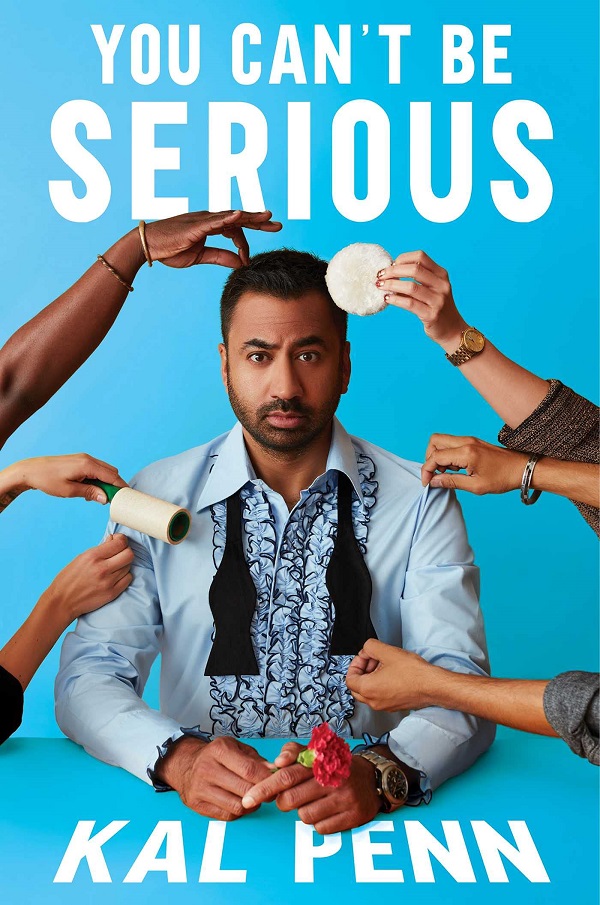
You Can't Be Serious cover
It was 2011, the day Kal Penn left his role as the associate director of the White House Office of Public Engagement, when his longtime acting manager told him he needed to write a book. After all, Penn had gone from White Castle to the White House in a two-year sabbatical from acting, which was a highly unusual career move. Penn felt at the time there wasn’t enough of a story to tell. Nevertheless, the seed was planted.
We’re living in a world where people don’t have one job or one interest and the idea that these things are mutually exclusive is no longer the way the world works. So I thought this might be an interesting time to share my story.
A few years later while Penn was teaching a Fiat Lux class for freshman at UCLA about his time in public service, he realized that maybe he did have a story to tell. And so he began writing a collection of essays about his life that he turned into his memoir.
“I think I did it for the 22-year-old me; the fifth-year at UCLA who wished there was a book that told him that all the crazy things you want to do, there’s a way to do them. Not that there’s ever a manual on how to do them but to hear that doing all those crazy things was OK would’ve been a nice thing.
“We’re also living in a world where people don’t have one job or one interest and the idea that these things are mutually exclusive is no longer the way the world works. So I thought this might be an interesting time to share my story.”
Penn is the son of Indian immigrants. His grandparents marched with Gandhi during the Indian Independence Movement. His parents came to the U.S. before he and his brother were born in the post-1965 wave of immigration when, because there was a high demand for engineers, his father got into a graduate engineering program. According to his father, he came to America with only $8 in his pocket.
“I thought about this story of my roots when I flew on Air Force One. I remembered calling my father from there. What happens is an operator dials the number for you and tells the person on the line ‘You have a call from Air Force One, please hold.’
“I got connected to him on the line and said ‘Hey, how’s it going?’
“He responded in shock, ‘What… you’re on Air Force One?’
“I said, ‘Yes.’
“And then there’s a long pause before he said, ‘How is it?’
“And I said, ‘It’s awesome!’”
Growing up in an immigrant family, Penn received a lot of pressure to become a doctor or to do “something practical” as a career, but acting had always been his first love. He loved storytelling, especially through performance, so when he saw the movie “Mississippi Masala,” directed by Mira Nair, in the eighth grade, it had a profound impact on him.
“It was the first time I saw brown people on screen who were not cartoon characters or conventional, and I thought, wow, if this woman can make this incredible movie, maybe I can do something similar too. I took that interest and tried to cultivate it.”
Penn understood the dream of his parents, like many immigrant parents, was for their children to achieve happiness through a stable career path. And yet, for Penn:
“It was very hard to explain to people that the thing you want to do comes from inside, it can’t just be explained by having a steady paycheck. I just knew [acting] is what I wanted to do.”
I thought, wow, if this woman can make this incredible movie, maybe I can do something similar too.
When it came time to hone his craft, Penn applied to 15 colleges and ultimately chose UCLA for its stellar academics, its world-class theater, film and television program, and its proximity to all the (Hollywood) studios.
“I had applied to three UC theater departments, and only one required an interview and an audition, which was UCLA. I got my first rejection letter from UC San Diego; my second from UC Santa Cruz. So I thought for sure I wasn’t getting into UCLA. But then that big envelope came in the mail… I was floored.
“The UCLA Theater program did satellite auditions for people who didn’t live in the L.A. area. Because I lived just outside of New York City, I did my audition very close to NYU. The day of the audition, there was a massive snowstorm. My plan was to take the train and then the subway to the audition, but the trains had shut down due to the blizzard. I knew my parents were not thrilled with me applying to theater schools, but my dad looked at me and he looked at the weather and he said, ‘Hurry up and get dressed, you’re gonna be late.’
“And I said, ‘The trains aren’t running.’
“He responded, ‘I know. I’m taking you. I’ll warm up the car.’
“It should’ve taken us 40 minutes to get to the theater but it took two and a half hours in the snow. I remember feeling this sense of gratitude. He didn’t want what I wanted at that time, but he still wanted to be there to support me.”
As a college student, Penn’s goals were two-fold: work as a professional actor and receive a great education. Yet, he knew that certain sacrifices would have to be made to achieve either. For example, in order to pursue an agent or land roles, sometimes he had to miss class for auditions or to beat the post office deadline for sending out his headshot. Several of his professors were not amenable to this type of schedule; therefore, he didn’t always get the best grades.
Penn’s curiosity and diversity of interests were on full display at UCLA. He once took a pre-med class on cells, tissues and organs as an elective just for fun.
“These were big, 400-person lectures that were insanely competitive, and here I am a theater major, just taking this class because I thought it was interesting. Sometimes I didn’t understand what the professor was talking about, so I would turn to the person next to me and ask, ‘Did you get what he just said?’
“They would immediately cover their notes and go, ‘Don’t look.’
“I told them, ‘I’m a theater major, it doesn’t matter,’ but then they would think that’s your move [to try to get their notes]. I thought, man, this is brutal.”
Penn ultimately had to drop that class as it graded on a curve and his C+ was not enough to pass it and keep up his GPA. But he tells this story to emphasize why he thought UCLA was such an exceptional school, for allowing a theater major like him the freedom to explore his intellectual interests outside his field and see where it took him. It’s a lesson that he’d draw upon later in life.
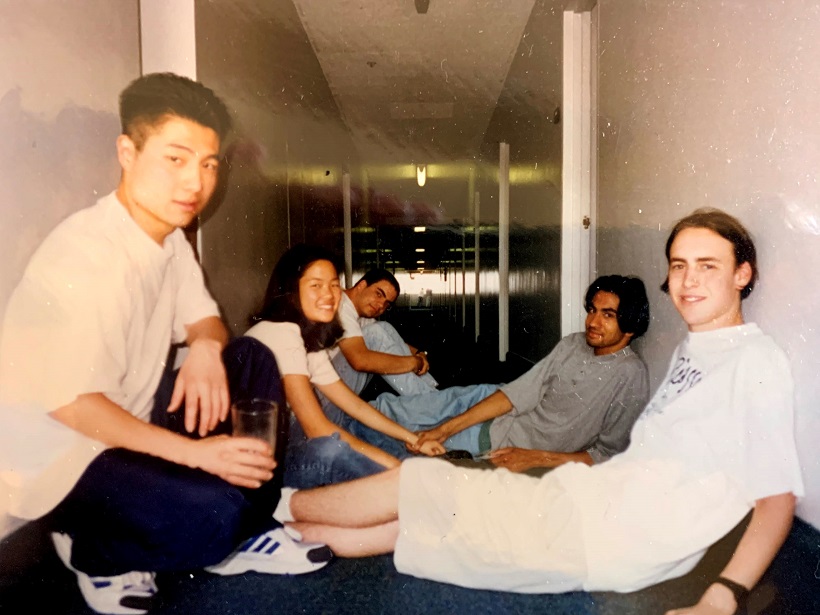
Friends of Kal Penn at Rieber Hall
And then there was the night he got handcuffed in the stairwell…
“I have an artist’s attention span. The way that sometimes manifests itself is in forgetful ways. One night we were studying in the dorms and someone had a pair of handcuffs as a joke; they were pretty sturdy. I thought it would be funny to handcuff two of our friends together and run away with the key, which I did, but planned to come back 15 minutes later. It was just a prank. But then I end up getting sucked into a study session and forgot.
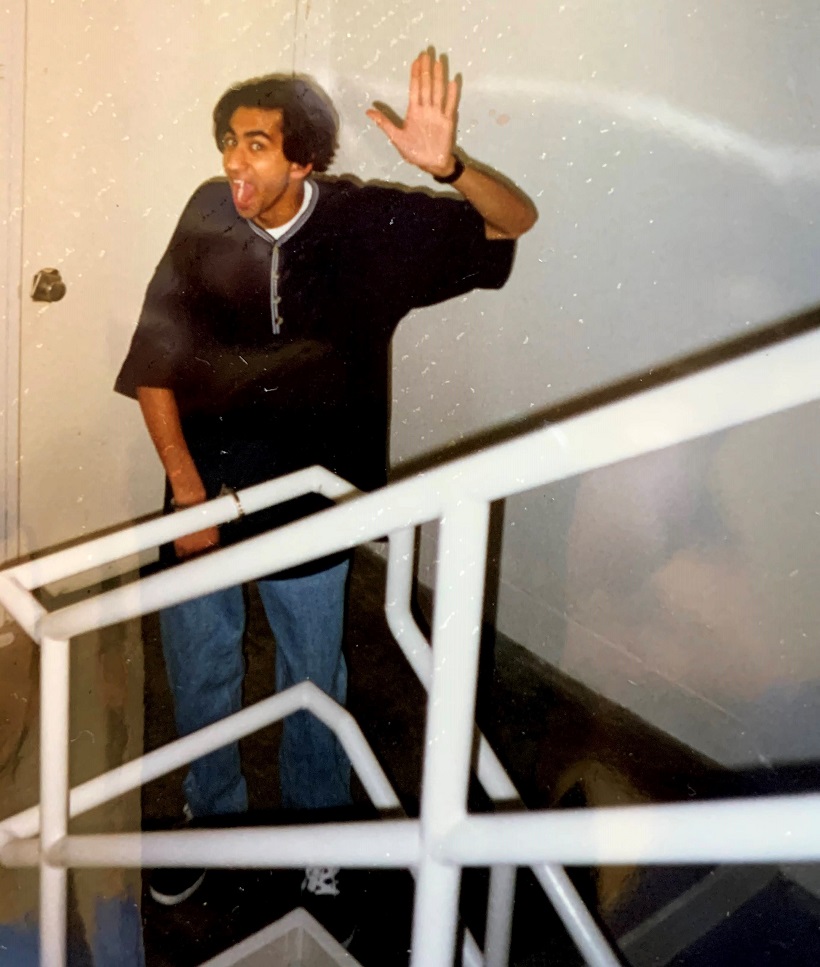
Kal Penn handcuffed to rail
“When I realized what I’d done, I jumped up and said, ‘Oh shit! I handcuffed these dudes together.’ I ran back over to them really apologetic. They were pretty calm. After I unlocked them, all of a sudden three other guys showed up, they held me down and carried me into the stairwell, handcuffed me to the railing and left. I think they even told the RA to skip that floor stairwell during their rounds. I was handcuffed there for four and a half hours. One of my friends took pity on me and brought me my text book so I could at least study. I absolutely deserved it though. It was my bad all the way.”
There were also moments of inspiration that had career implications…
“I saw a flyer that Mira Nair, the one who directed ‘Mississippi Massala,’ was speaking on campus. I was so excited. This woman was one of the reasons I decided to become a theater major. I had to go see her. After the event I went up to her and gave her my headshot and she politely said, ‘Wonderful,’ just before she was swarmed by all these older film buffs. I tell this story because it wasn’t for another 10 years later she was casting for the movie ‘The Namesake’ which I ended up being cast in. To go from [admiring] this woman, who was such a role model for me in high school; to then having the chance to see her at UCLA, which kept me going; to then being able to work with her as a professional artist in my own right ꟷ I had come full circle.”
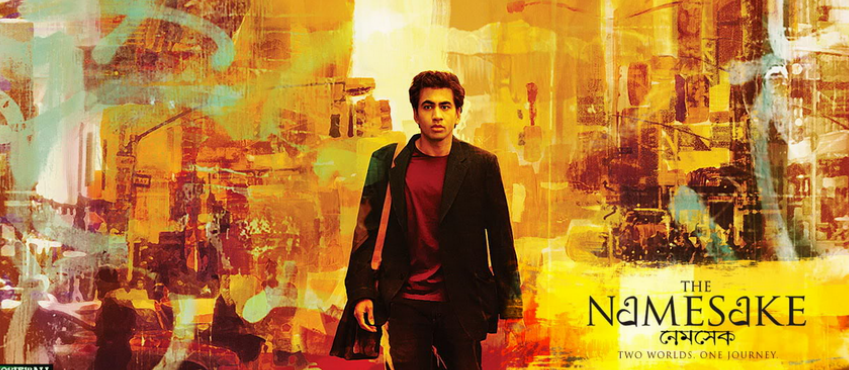
The Namesake
“For three quarters, my friends and I in Rieber 6 South rushed fraternities for the free food. They would have these amazing lobster and steak nights. As 18- and 19-year-olds, we were drawn to these fancy dinners in groups. It’s not like you even had to talk to anybody, you just got their free food. After the third trimester of doing this, I went to one where I actually liked some of the guys who I was meeting. They seemed incredibly well-rounded. Some of them were theater majors, athletes, science majors ꟷ it was the epitome of what UCLA had to offer where people were doing everything at once and enjoyed excelling in all those things. I kept going to their events and eventually I became a pledge.
“They had these three Hell Nights you had to go through before you can officially become a member. The first Hell Night was a scavenger hunt in the middle of the night, which got me home around 5 in the morning. Before the second Hell Night, I happened to have booked my first TV commercial. This was a really big deal because it would’ve made me eligible to join the Screen Actors Guild, a union that actors needed to join. The commercial shot the morning after the second Hell Night. I obviously couldn’t be up all night; this was my first real opportunity, the reason why I moved to California and came to UCLA. I went in to talk to some of the guys in the house and asked them, ‘How does this work? Can we move that night or can I defer a quarter?’
“They asked me to go wait in the big room while they discussed it, so I waited. They called me back in 10 minutes later. The room was dark. There were eight dudes sitting on two couches with a coffee table in the middle that had the fraternity handbook next to some candles. They said, ‘You know this is a real decision point for you. We want to be supportive but we need you to know that we can’t move a night that special. You’re going to have to decide: do you want to be in the house or do you want to go and do a TV commercial?’
“Then I stood up and said, ‘Well, it was really nice to meet you guys. Thanks for a great couple of weeks. Obviously I’ll be choosing the TV commercial; that’s what I want to do with my life. But no hard feelings. Thanks for the opportunity.’ The looks on their faces… they were so floored. Nobody had done this before. But they were respectful of my decision. I would still see them around campus and it was all good.”
He told me that someone that looks like you is just never gonna work in Hollywood.
Breaking into the entertainment business came with a lot of struggle, rejection and even discrimination. Like many actors trying to find work, Penn knew he needed representation if he was going to go anywhere in this industry. He would religiously send out his headshots trying to find an agent who would take him.
“One of my good friends in the theater department had a roommate who was an actor named Jenna von Oy. She said, ‘Why don’t I take your headshot in to my manager and see if he’ll meet with you. You’re a UCLA Theater major; that’s a big deal in L.A., you should be represented. He should at least meet you.’
“A week later, she called me very disturbed. She said, ‘I’m really sorry about this but he said he doesn’t want to meet with you. Do you want me to share any of the circumstances or would you rather not because it would be hard for you to hear?’
“I said, ‘I always like to know what I’m dealing with. Whatever I did wrong I’d like to improve on it.’
“She replied, ‘There’s nothing you could have done differently. He told me that someone that looks like you is just never gonna work in Hollywood. So it’s not worth his time to represent you or to even meet with you.’”
Penn goes on to recount more stories in those days early in his career, where he walked into auditions and was told he spoke good English or asked where his turban was or if he could go home and wrap a bedsheet around his head. One assistant behind a desk went so far as to speak to him very slowly and loudly as if he were a deaf foreigner.
“I bring these stories up because every actor struggles with the way that the industry will see them and the way that you’re put into a little box. Oftentimes you’re told you’re too tall, you’re too short, you’re too fat, you’re too skinny ꟷ when you’re a performer of color you’re told you’re too ethnic. You don’t have the luxury of those other physical attributes. The frustration for a lot of performers of color is not that things are hard, they’re supposed to be hard; you’re choosing a career that’s incredibly complex and difficult, but you at least want to have the opportunity to fail based on your merits or based on the things that everybody else has to go up against.”
Looking back, Penn remembers the best career advice he ever received, which came from a speaker he saw at UCLA during his second year (whose name he can’t recall).
“She was the only woman of color on network television at the time. Somebody in the audience asked her, ‘What do you do during auditions knowing there’s so many roles you’re not going to get because they just don’t want a Black woman in that role?’
“She said, ‘I make sure that I’m prepared. I walk into every audition knowing that I went to a great school, that I am a classically trained actor, that I’ve done Shakespeare, that I’m better than anybody else who goes in there, and they know and I know that I’ve had to work 20 times harder just to get my foot in the door. And if they don’t want to hire me despite all of that, I know that they know it and I know that they know why. I leave that at the door.’
“That was really strong advice for me because to know you’re giving your all to the journey is all any of us can ever ask for.”
For the next decade after graduating, Penn went on to appear in a variety of hit movies from “Van Wilder” (2002) to “Harold & Kumar Go to White Castle” (2004) to “The Namesake” (2006). But it was while working on the TV show “House” in 2007 that his co-star and good friend Olivia Wilde introduced him to the next journey he would embark upon ꟷ politics and public service.
“She knocked on my trailer door one day and said, ‘I know that you follow politics; do you want to come to an event with me? Barrack Obama is speaking in L.A. a week from tonight and I have a plus-one.’
“I replied, ‘No, not really. I know when politicians come to L.A. they usually ask for things like donations or help with their campaign. I’m not interested in politics. I’m interested in public service.’
“But then she kept asking again and again, so I finally relented and agreed to come.
“Now the Bruin in me was thinking there’s going to be a lot of Hollywood people there, so I figured I was going to impress them with my question. I did some research into Obama’s platform on climate change. Specifically, I read an article in Foreign Affairs Magazine on the impact of corn and ethanol production. That’ll be my question. In a room full of actors, I’m going to be the guy that asks this hard-hitting policy question. This will be my moment to shine.’
“At the event, I got my chance. ‘Senator, I have a question for you. I was poking around your website and noticed you have a big plan for turning corn into ethanol for fuel. If we do that wouldn’t it drive up the price of corn in developing countries and make it harder for them to afford food?’ Bam! I got him.
“Then Obama looked at me very casually and nonchalantly said, ‘Yeah, I read that article in Foreign Affairs too. No, my plan is to use corn as a bridge to sell cellulosic ethanol so we can make fuel one day from things like the leaves in our yard or grass clippings.’
“And I was just like, ‘Oh, oh, ok.’ He just schooled me… with grace… but he obviously knew what he was doing. I walked away from that thinking this person was very different from politicians I had met before.”
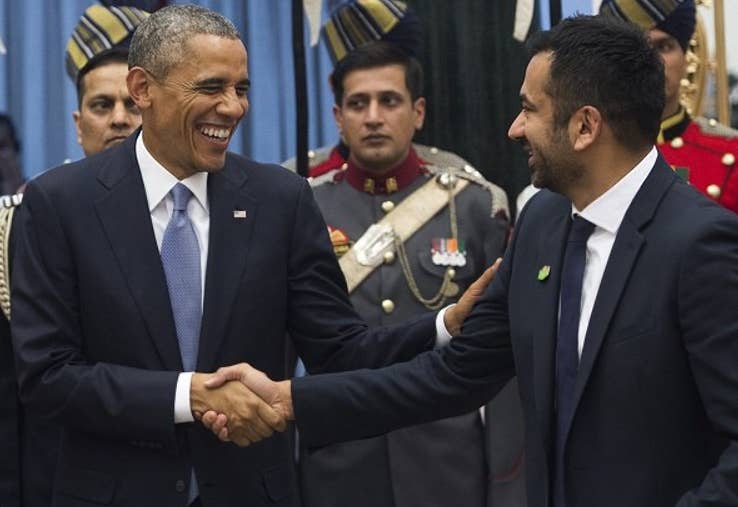
Kal Penn With President Obama (Saul Loeb - AFP - Getty Images)
Fast forward to after the election and Penn applied for a job to work in the new administration using the campaign website that collected résumés. However, rather than using his networks to flag his application, the only person he told he’d applied was his manager. The night of the Inauguration, he’s backstage behind the rope line where he and his manager met Michelle Obama for the first time.
“She casually said to me, ‘Kal, I hope you continue to stay involved. You were a real help to us during this campaign.’
“Then my manager, who I would only describe as every character from the TV show ‘Entourage’ roped into one person, blurted out, ‘Well, Mrs. Obama, you know he applied for a job, right?’
“She looked at me quizzically and asked, ‘What do you mean? Where did you apply?’
“And I blurted out, ‘Well, I applied on the website.’
“She looked me as if I dropped a piece of pizza on the floor, picked it up and ate it in front of her. Unmistakably, it was the look of ‘What’s wrong with you? Do you actually not want this job? Why didn’t you think to tell us?’
“What I realized then was when you’ve worked for a company for a year and a half and that company experiences tremendous growth, and they’ve trusted and relied on you in the role that you had during that growth; if you want to continue working for them, let them know. Because if you don’t, it looks really disrespectful.”
The President and First Lady were able to flag Penn’s application with the right people and he was hired as an associate director in the White House Office of Public Engagement. His specific duties involved outreach to Asian and Pacific Islander communities and the arts community and serving as the President’s liaison to young Americans. His first week on the job was an interesting one, narrowly avoiding an embarrassing situation.
“I was getting a haircut from a guy named Rudolfo near my apartment by DuPont Circle. He recognized me as an actor and was a really friendly guy, very chatty. Throughout the conversation, he kept inviting me to his tapas bar, which he owns in addition to being a barber. I told him I worked in the Public Outreach Office and he said that I should bring everybody from the White House. He emphasized that he was a small business owner of color and it would be amazing if the President could come too. I thought maybe it would be cool to bring my team in Public Engagement to his tapas bar so I asked for his card. He slipped it into my pocket as he finished up my haircut.
“Later that night, as I emptied out my pockets, I came upon his card and saw the barber pole with two scantily clad animated women on the front. The card read, ‘Rudolfo’s Lounge and Topless Bar.’ He had been saying topless bar instead of tapas bar all along. I thought oh my god! I had just agreed to take the entire White House Office of Public Engagement to a strip club. The last thing I need is for him to call TMZ or Politico and tell them Kal Penn has agreed to take this whole office to his topless bar.”
Luckily, none of that happened, but due to [his office’s] policy of full transparency, Penn did have to disclose this misunderstanding to his boss during his first week on the job.
“You Can’t Be Serious” is filled with many more stories about Penn’s unusual career choices and even details his first date and recently announced engagement to his partner of 11 years, Josh. Ever the performer, his number one goal in writing this book was to make people laugh. Secondly, he wrote it for people like him who have a multitude of interests and want to find a way to fulfill them.
“The title is a double entendre, for those of us who want to do a whole bunch of things in our short lifespan and are sometimes told, ‘This is crazy. You can’t do this. What are you talking about?’ So this was written for people who have toyed with the idea of what that looks like and those who have started exploring it. It is possible. And for me, the origin of that story was at UCLA.”
Kal Penn’s memoir “You Can’t Be Serious” is out now and is available for purchase through major book retailers.